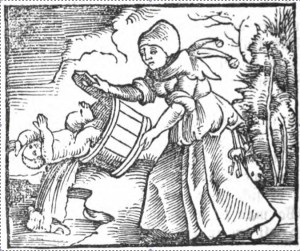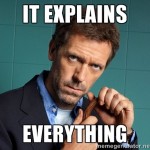“A church which raises itself in its message
And it’s devotion to the God above the god of theism
Without sacrificing it’s concrete symbols
Can mediate a courage which takes doubt and meaninglessness into itself.”
— Paul Tillich
A “long time friend” of the Unitarian chruch
This past Sunday, a member of my Unitarian church asked me if I was a member yet. I’m not. I’ve been going for 3 years I think. Nearly every Sunday I attend the Unitarian church, I struggle with my ambiguous status as a “long-time friend” but not-yet member. (Three years is really not so long, but that’s the term that is used.) Why haven’t I joined? I attend regularly. I contribute financially. I have friends there. It’s been a positive experience for me and for my wife and children. I even call it “my” Unitarian church. Why not join?
What holds me back, I think, is this: I don’t believe in it. Perhaps it is a remnant of my being raised in the Mormon church, but it does not seem like enough to want to be a part of the local religious community; I feel like I need to believe in the mission of the UU. And I just don’t. I can’t help but look at the UU as a failure — not my local congregation, but the UU as a whole. It’s a great place to go on Sunday. It’s a refuge from religious intolerance and a necessary waystation for many on their way out of their religion of origin. It does good work in promoting social justice. But as John Trevor wrote in 1910:
“My respect for individual Unitarians is unbounded. And yet their religious position as a denomination is one which I have always deeply regretted. For want of something, I know not what, all their freedom, all their knowledge, all their generosity, all their high personal character— everything which seems to mark them out as the one denomination to lead the van of religious and social emancipation—never comes to the point of making them a great reforming power. People, with qualities in many respects far inferior to theirs, are moving the world to-day; while they, perplexed and pained as they are, and anxious to find the road by which they may march forward, are scarcely able to maintain the status of their own churches.”
This quote could have been written today, instead of 100 years ago. It could have been written by me, or by many other people with whom I attend the First Unitarian church on Sundays. I think there are a handful of people there who believe in Unitarian Universalism, for whom UUism is their religion. But it seems that, for many more — Pagans, Buddhists, Christians, and others of various labels or none at all — Unitarianism is less an object of faith or a religious identity, and more of a convenient meeting place. I have an idea why that is.
The search for “pure religion”
A couple of posts ago, I wrote about a PBS documentary, Beyond Our Differences, which we are watching in the Sunday morning discussion group. in my Unitarian church. The movie explores “the fundamental unity of the world’s religions”. It features interviews with the Dalai Lama, Archbishop Desmond Tutu, Karen Armstrong, Deepak Chopra and dozens of other religious leaders and authors. It’s the kind of thing you would expect to find being shown in the Unitarian church. And I think it goes to the heart of the problem with the UU.
A search for a “fundamental unity” at the heart of the world’s religions is a favorite pastime of religious liberals. But I can’t get over the feeling that, in these discussion, we are cherry picking. Whatever we like about a religion, we call that the “core”; and whatever we don’t like, we call that mere “culture” or “politics”. So, in the segment we watched this past Sunday, we listened to Shukria Barakzai, a member of Afghani National Assembly, a Muslim woman who had been subject to public beating by the Taliban for appearing in public (in full berka) without a male relative. (She was on her way to the doctor.) She has since become an advocate for women’s education in Afghanistan and was injured in a suicide bombing. And in my discussion group, we readily identify Barakzai’s work for social justice as “real Islam” and the motivation of the man who beat her as a perversion of Islam. Similarly, we condemn the Westboro Baptist Church as an aberration of “pure Christianity”. But I’m not so sure that such bright lines can be drawn.
For one thing, the practice of rooting out “real religion” appears to me to be disturbingly similar to the practice of religious fundamentalists of all stripes. Both religious liberals and fundamentalists focus on what they like about a religion, call that “pure” or “core” or “fundamental”, and dismiss the rest as unworthy. We differ only in terms of what we choose to hold up as “fundamental”. But I wonder whether there is such a thing as “pure religion”. We don’t talk about “pure culture” or “pure politics”. Why should religion be any different? All of these — religion, culture, politics, etc. — are human activities, and so they are bound to be both good and bad, just as we humans are a mixture of good and bad.
I think the reason we religious liberals are so committed to this search for pure religion is that we feel the need to justify our religiosity. In a world where so many liberals have given up on religion altogether, religious liberals feel the need to justify themselves to other liberals. I think perhaps, though, rather than seeking to justify our choice rationally, we would be better off just acknowledging that we feel the need for religion in order to feel fully human (while other people do not). And in doing so, we have to accept at least some of the bad that comes with the good.
 One of the problems with the search for “pure religion” is that, by dismissing the negative side of religion as “not real religion”, we overlook how the positive and negative aspects of religion are intertwined. Take for example my own religion of origin, Mormonism. I have long wondered why it is not possible to “take the patriarchy out” of Mormonism and leave the parts that are healthy and life-affirming. Is it not possible to have a Mormonism with strong family values and a commitment to healthy lifestyle without male domination and teetotaling? I’m beginning to think not. I wonder if it’s a liberal myth that we can throw the bathwater out and hold on to the baby. And it is my experience with Unitarianism itself that has caused me to wonder this.
One of the problems with the search for “pure religion” is that, by dismissing the negative side of religion as “not real religion”, we overlook how the positive and negative aspects of religion are intertwined. Take for example my own religion of origin, Mormonism. I have long wondered why it is not possible to “take the patriarchy out” of Mormonism and leave the parts that are healthy and life-affirming. Is it not possible to have a Mormonism with strong family values and a commitment to healthy lifestyle without male domination and teetotaling? I’m beginning to think not. I wonder if it’s a liberal myth that we can throw the bathwater out and hold on to the baby. And it is my experience with Unitarianism itself that has caused me to wonder this.
The bankruptcy of rational religion
Unitarianism represents the culmination of a thought experiment which began in the 19th century: Is it possible to have a rational religion? Can we rationally select the parts of Christianity (and other religions) that we approve of and discard the rest? It was a noble endeavor. But almost before it had begun, its founders were questioning the possibility of success.
William Ellery Channing, the father of Unitarianism in America, wrote in 1820 that Unitarians had sacrificed “imagination and poetic enthusiasm” to “the rational and critical power”. Emerson bemoaned the lack of enthusiasm in Unitarianism. Theodore Parker decried the absence of a “deep internal feeling of piety”: “Most powerfully preaching to the Understanding, the Conscience, and the Will, the cry was ever, ‘Duty, Duty! Work, Work!’ They failed to address with equal power the Soul, and did not also shout, ‘Joy, Joy! Delight, Delight!’” Orestes Brownson, a Transcendentalist who converted to Catholicism, wrote of Unitarians, that they “had pronounced the everlasting ‘No.’ Were they never to be able to pronounce the everlasting ‘Yes’?” And Unitarian minister, John Trevor, a generation later, regretted the absence of “enthusiasm and personal abandonment” in Unitarianism: “It is the last word of the Old Gospel, sifted small through the riddle of the Intellect; not the first word of the New Gospel, bursting up irresistibly from the Spirit.” These were all men who had great respect for Unitarianism and its ambition to advance social justice, but who found it lacking in something essential.
And little has changed in the almost two centuries since Channing and the rest. Unitarianism, and later Unitarian Universalism, has limped along ever since. For all the reasons religious “nones” are fleeing traditional religion in droves, one would expect the UUA would be seeing corresponding growth. But instead, the “nones” are staying home. And I can’t help but think that reason lies at least as much with Unitarianism as with the “nones” themselves. In 1979, the then-president of the UUA, Gene Pickett, observed in his inaugural address:
“The deeper malaise lies in our confusion as to what word we have to spread. The old watchwords of liberalism–freedom, reason, and tolerance–worthy though they may be, are simply not catching the imagination of the contemporary world. They describe a process for approaching the religious depths but they testify to no intimate acquaintance with the depths themselves. If we are ever to speak to a new age, we must supplement our seeking with some profound religious finds.”
That was written in 1979, and I’m sorry to say that I see no profound religious finds in Unitarianism in the last three decades. Of course, individual Unitarian must be making these finds, but they are not made a part the communal life of the Church.
Why should that be? I think the answer is that the project of which Unitarian Universalism is the culmination, religious humanism, was doomed from the start. We can try to rationally choose what parts of religion to keep and discard the rest, but it seems inevitable that in the process we discard something essential. I wonder if it is a coincidence that those religions that religious humanists most readily condemn, those that seem intolerant and narrow-minded, are often also the religions which seem to have the most transformative power in people’s lives. Religious liberals take aim at the evangelicals and the mega-churches, but clearly the latter are on to something. And it’s too simple of an answer to dismiss it all as human stupidity, as liberals are fond of doing. As Jeff Daniels’ character says on the first episode of The Newsroom, “You know why people don’t like liberals? Because they lose. If liberals are so f***ing smart, how come they lose so g**damn always?” No, I think that the evangelicals and the fundamentalists have something that Unitarians and other religious humanists and other religious liberals are blind to.
What if the baby is the bathwater?
It seems to me that, in religious matters, we just can’t throw out the proverbial bathwater without throwing out the baby too. Perhaps, in some sense, the baby is the bathwater. Because religion is a human endeavor, and we humans are mixed bag, it seems there is no separating the good and the bad in religion — at least not entirely. I don’t think it’s really possible to have the enthusiasm, the self-transcendence, and the transforming power without at least risking superstition, literalism, and intolerance.
Take Paganism for example. I have many of the same issues with Naturalistic or Humanistic Paganism that I have with UUism. And I write this self-consciously as the managing editor of the HumanisticPaganism.com community blog. I am grateful and proud of the role that the site plays for many Naturalistic and Humanistic Pagans, but the community resembles Unitarianism is many ways: we’d rather talk about experience than have an experience. On the other hand, when I look at devotional polytheism, I see instances of what I would call superstition, literalism, and intolerance. But I also see the enthusiasm, self-transcendence, and transformative power that are lacking in Naturalistic and Humanistic Paganism. And I also see real potential for community, that is wanting among religious humanists. Is this a coincidence? I don’t think so.
I’ve written about this issue before, many times before. It seems I cycle around to this issue once a year or so. The truth is I just can’t seem to let go of the UU, because it seems to be the only place I can find liberal religious community, even though it leaves me spiritually wanting. But I want to have it all, and I want it in one place. The UU has community and structure, but lacks spirit and transcendence. Paganism has the spirit and transcendence, but not the community or structure. I don’t really want Pagan congregationalism, either. Nor do I want to turn my Unitarian church into a CUUPS chapter. So where does that leave me? For the time being, that makes me a Pagan friend, but not-yet-member, of the Unitarian church.
















